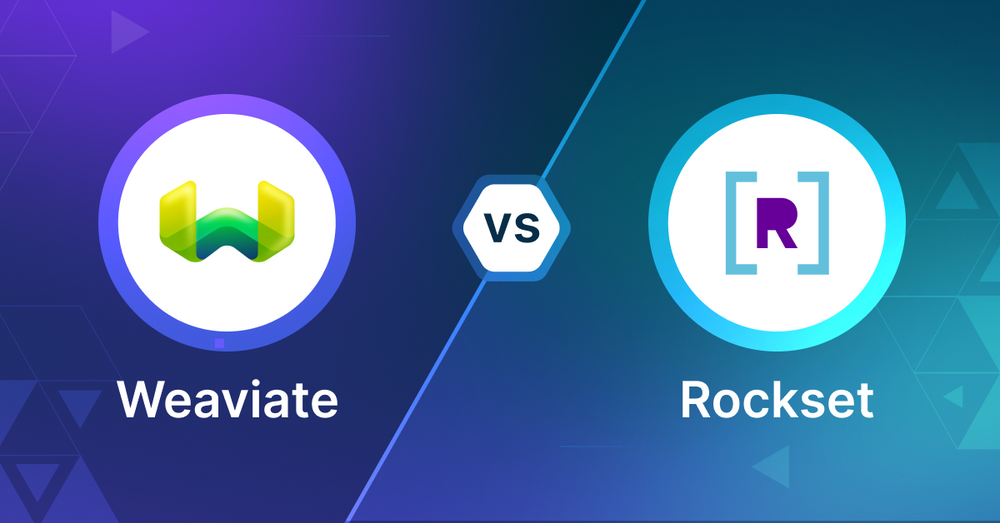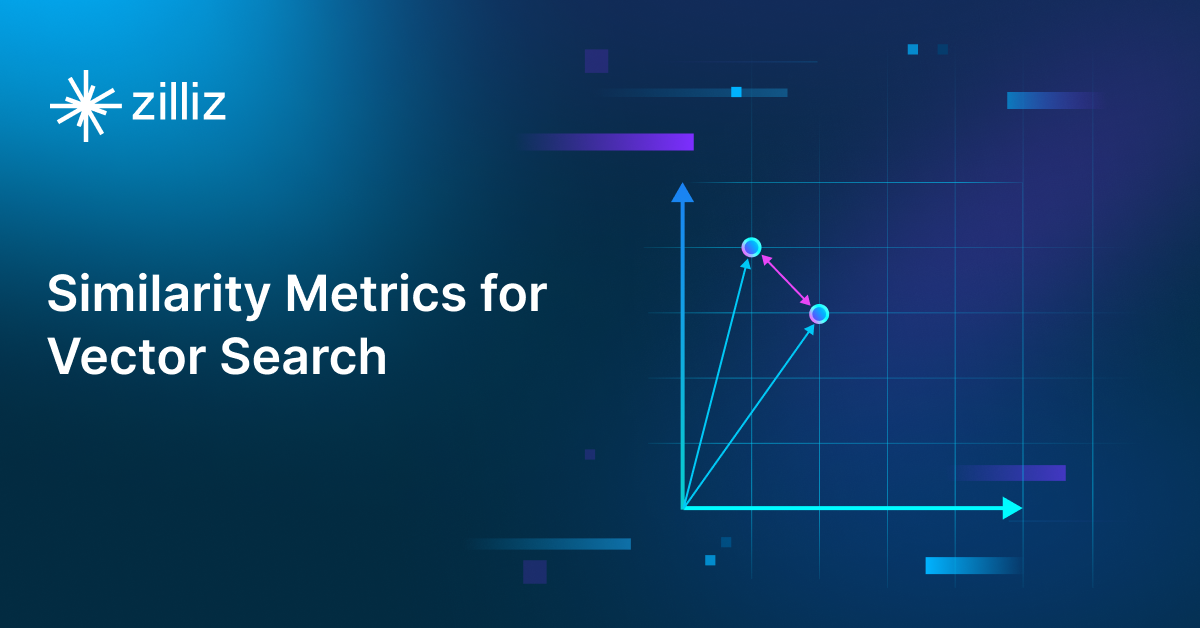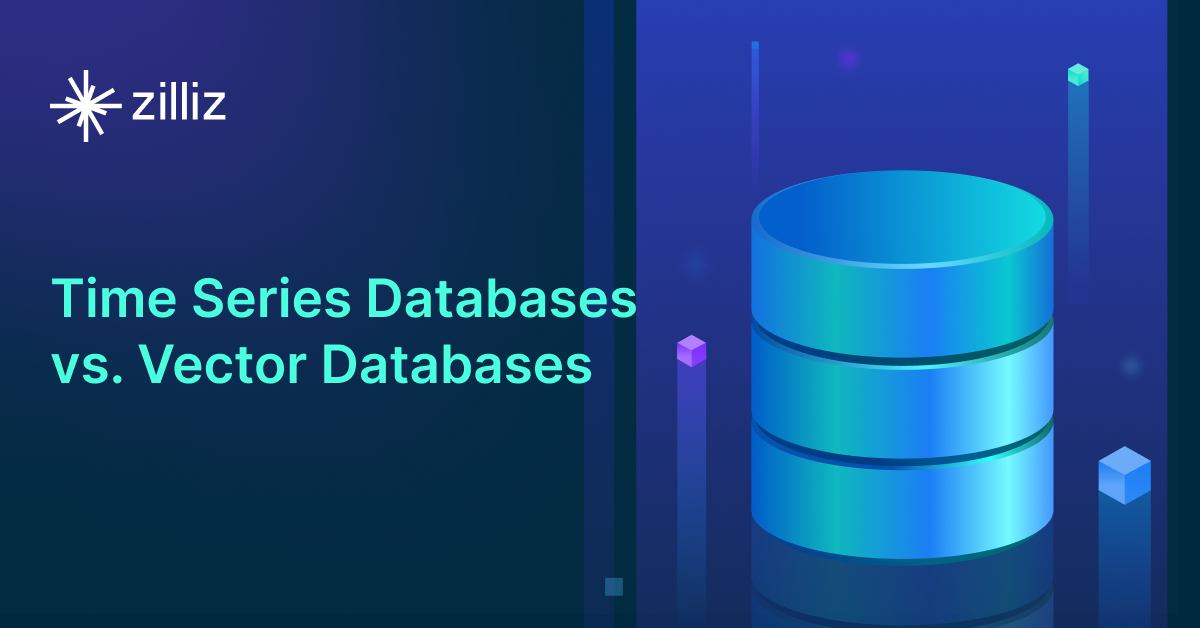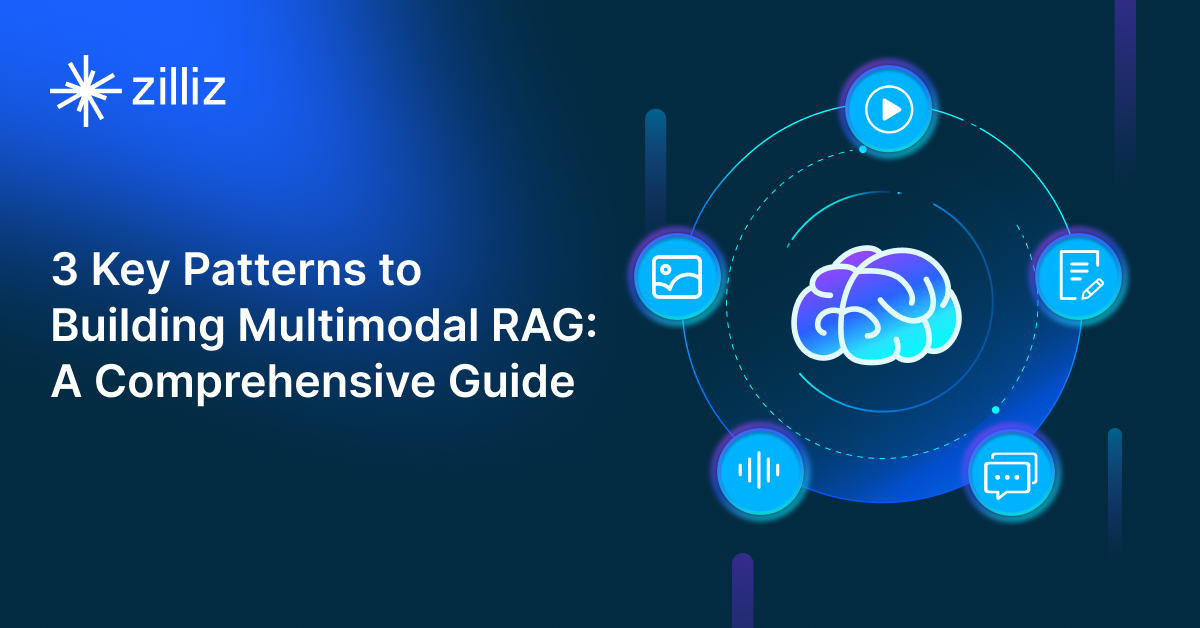Weaviate vs Rockset: Choosing the Right Vector Database for Your Needs

As AI and data-driven technologies advance, selecting an appropriate vector database for your application is becoming increasingly important. Weaviate and Rockset are two options in this space. This article compares these technologies to help you make an informed decision for your project.
What is a Vector Database?
Before we compare Weaviate and Rockset, let's first explore the concept of vector databases.
A vector database is specifically designed to store and query high-dimensional vectors, which are numerical representations of unstructured data. These vectors encode complex information, such as the semantic meaning of text, the visual features of images, or product attributes. By enabling efficient similarity searches, vector databases play a pivotal role in AI applications, allowing for more advanced data analysis and retrieval.
Common use cases for vector databases include e-commerce product recommendations, content discovery platforms, anomaly detection in cybersecurity, medical image analysis, and natural language processing (NLP) tasks. They also play a crucial role in Retrieval Augmented Generation (RAG), a technique that enhances the performance of large language models (LLMs) by providing external knowledge to reduce issues like AI hallucinations.
There are many types of vector databases available in the market, including:
- Purpose-built vector databases such as Milvus, Zilliz Cloud (fully managed Milvus), and Weaviate
- Vector search libraries such as Faiss and Annoy.
- Lightweight vector databases such as Chroma and Milvus Lite.
- Traditional databases with vector search add-ons capable of performing small-scale vector searches.
Weaviate is a purpose-built vector database and Rockset is a search and analytics database. This post compares their vector search capabilities.
Weaviate: Overview and Core Technology
Weaviate is an open-source vector database designed to simplify AI application development. It offers built-in vector and hybrid search capabilities, easy integration with machine learning models, and a focus on data privacy. These features aim to help developers of various skill levels create, iterate, and scale AI applications more efficiently.
One of Weaviate's strengths is its fast and accurate similarity search. It uses HNSW (Hierarchical Navigable Small World) indexing to enable vector search on large datasets. Weaviate also supports combining vector searches with traditional filters, allowing for powerful hybrid queries that leverage both semantic similarity and specific data attributes.
Key features of Weaviate include:
- PQ compression for efficient storage and retrieval
- Hybrid search with an alpha parameter for tuning between BM25 and vector search
- Built-in plugins for embeddings and reranking, which ease development
Weaviate is an entry point for developers to try out vector search. It offers a developer-friendly approach with a simple setup and well-documented APIs. Deep integration with the GenAI ecosystem makes it suitable for small projects or proof-of-concept work. The target audience for Weaviate are software engineers building AI applications, data engineers working with large datasets and data scientists deploying machine learning models. Weaviate simplifies semantic search, recommendation systems, content classification and other AI features.
Weaviate is designed to scale horizontally so it can handle large datasets and high query loads by distributing data across multiple nodes in a cluster. It supports multi-modal data, works with various data types (text, images, audio, video) depending on the vectorization modules used. Weaviate provides both RESTful and GraphQL APIs for flexibility in how developers interact with the database.
However, for large-scale production environments, there are several considerations to keep in mind:
- Limited enterprise-grade security features
- Potential scalability challenges with multi-billion vector datasets
- Manual management required for newly released tiered storage options
- Horizontal scale-up requires assistance from Weaviate engineers and cannot be done automatically
This last point is particularly noteworthy, as it means organizations need to plan ahead and allocate time for scaling operations, ensuring they don't approach their system limits without proper preparation.
Rockset: Overview and Core Technology
Rockset is a real-time search and analytics database for structured and unstructured data, including vector embeddings. Its sweet spot is ingesting, indexing and querying data in real-time so it’s great for applications that need up-to-the-second insights. Rockset supports both streaming and bulk data ingestion, can process high velocity event streams and change data capture (CDC) feeds in 1-2 seconds.
One of Rockset’s key features is Converged Indexing built on mutable RocksDB. This allows for in-place updates of vectors and metadata so it’s super efficient for scenarios where data changes frequently. Rockset can handle documents up to 40MB and supports vector dimensionality up to 200,000 so it’s good for a wide range of vector embedding use cases.
Rockset has vector search built into the core. It supports K-Nearest Neighbors (KNN) and Approximate Nearest Neighbors (ANN) search methods and uses a distributed FAISS index for scalability. Rockset is algorithm agnostic, so you can choose your own search implementation. The cost-based optimizer can dynamically choose between KNN and ANN search methods for optimal performance.
What’s unique about Rockset for vector search is the Converged Index which combines search, ANN, columnar and row indexes into one. This means you can handle a wide range of query patterns out of the box. Rockset also supports metadata filtering and hybrid search. The optimizer will choose the most efficient query path. Can search across multiple ANN fields, supports multi-modal models and has both SQL and REST APIs for query interface.
Key Differences
When choosing between Weaviate and Rockset as vector search tools you need to know the differences. Both are powerful but excel in different areas. Let’s compare them across several key aspects to help you make a decision.
Search Methodology
Weaviate uses HNSW (Hierarchical Navigable Small World) indexing for vector search which is fast and accurate on large datasets. It also supports hybrid search, combining vector similarity with traditional filters.
Rockset offers K-Nearest Neighbors (KNN) and Approximate Nearest Neighbors (ANN) search methods. It uses a distributed FAISS index for scalability and can dynamically choose between KNN and ANN for best performance.
Data
Weaviate works with multi-modal data, supports various types like text, images, audio, video. It’s designed to handle large datasets.
Rockset excels in real-time data processing. It can ingest and index structured and unstructured data, including vector embeddings, in seconds. Rockset can process high-velocity event streams and change data capture feeds in 1-2 seconds.
Scalability and Performance
Weaviate can scale horizontally, distributing data across multiple nodes in a cluster. But scaling beyond billions of vectors will require Weaviate engineers' help.
Rockset has a Converged Index that combines search, ANN, columnar and row indexes. This allows it to handle many query patterns. Rockset is built for real-time search and analytics so it’s good for applications that need up-to-the-second insights.
Flexibility and Customization
Weaviate has built-in plugins for embeddings and reranking which simplifies development. It has both RESTful and GraphQL APIs so developers have flexibility on how to interact with the database.
Rockset is algorithm-agnostic, so users can choose their own search implementation. It supports metadata filtering and hybrid search with an optimizer that chooses the best query path.
Integration and Ecosystem
Weaviate has deep integration with the GenAI ecosystem so it’s good for AI applications, semantic search, recommendation systems and content classification.
Rockset supports both streaming and bulk data ingestion so it’s good for many data sources. It has SQL and REST APIs for querying, which makes it easy to integrate with existing systems.
Ease of Use
Weaviate is known for being developer friendly with a simple setup and well documented APIs. So it’s a good entry point for those new to vector search.
Rockset’s ease of use comes from the fact it can handle many data types and query patterns out of the box. Its cost-based optimizer can automatically choose the best search method, so you might not need to tune manually.
Cost
No pricing information is provided but Weaviate’s horizontal scaling requires manual management and help from their engineers. This might add to operational costs for large deployments.
No pricing information is provided, but real-time processing might be valuable for applications that need data in real-time.
Security Features
Weaviate has limited enterprise grade security features, so it might not be suitable for some organizations.
When to Choose Each
Weaviate is for projects that are AI-first, especially those with semantic search, recommendation systems or content classification. For projects with large, multi-modal datasets (text, images, audio, video) and need vector search. Weaviate is developer friendly and deeply integrated with the GenAI ecosystem so perfect for teams building AI from scratch or adding vector search to existing systems without much config.
Rockset is for use cases that need real-time data processing and analytics. When you need to ingest, index and query data with zero latency it’s the way to go. For applications that need up-to-the-second insights. Rockset is for high-velocity event streams, frequent data updates or when you need to combine vector search with complex SQL queries. It can handle both structured and unstructured data and real-time processing so it’s a great choice for modern data intensive applications that need immediate actionable insights.
Conclusion
Weaviate is for AI-centric approach, vector search with good scalability and multi-modal data support. Simple and ecosystem integrated so good for AI application development. Rockset is for real-time data processing and analytics, versatile for high-velocity data streams and complex query patterns. Choose Weaviate if you’re building AI applications and vector search, Rockset if real-time processing and analytics is your priority. Ultimately your choice should match your project’s needs, considering data volume, update frequency, query complexity and the balance between vector and traditional search.
While this article provides an overview of Weaviate and Rockset, it's key to evaluate these databases based on your specific use case. One tool that can assist in this process is VectorDBBench, an open-source benchmarking tool designed for comparing vector database performance. Ultimately, thorough benchmarking with specific datasets and query patterns will be essential in making an informed decision between these two powerful, yet distinct, approaches to vector search in distributed database systems.
Using Open-source VectorDBBench to Evaluate and Compare Vector Databases on Your Own
VectorDBBench is an open-source benchmarking tool designed for users who require high-performance data storage and retrieval systems, particularly vector databases. This tool allows users to test and compare the performance of different vector database systems such as Milvus and Zilliz Cloud (the managed Milvus) using their own datasets and determine the most suitable one for their use cases. Using VectorDBBench, users can make informed decisions based on the actual vector database performance rather than relying on marketing claims or anecdotal evidence.
VectorDBBench is written in Python and licensed under the MIT open-source license, meaning anyone can freely use, modify, and distribute it. The tool is actively maintained by a community of developers committed to improving its features and performance.
Download VectorDBBench from its GitHub repository to reproduce our benchmark results or obtain performance results on your own datasets.
Take a quick look at the performance of mainstream vector databases on the VectorDBBench Leaderboard.
Read the following blogs to learn more about vector database evaluation.
Further Resources about VectorDB, GenAI, and ML
- What is a Vector Database?
- Weaviate: Overview and Core Technology
- Rockset: Overview and Core Technology
- Key Differences
- When to Choose Each
- Conclusion
- Using Open-source VectorDBBench to Evaluate and Compare Vector Databases on Your Own
- Further Resources about VectorDB, GenAI, and ML
Content
Start Free, Scale Easily
Try the fully-managed vector database built for your GenAI applications.
Try Zilliz Cloud for FreeKeep Reading

Similarity Metrics for Vector Search
Exploring five similarity metrics for vector search: L2 or Euclidean distance, cosine distance, inner product, and hamming distance.

Vector Databases vs. Time Series Databases
Use a vector database for similarity search and semantic relationships; use a time series database for tracking value changes over time.

3 Key Patterns to Building Multimodal RAG: A Comprehensive Guide
These multimodal RAG patterns include grounding all modalities into a primary modality, embedding them into a unified vector space, or employing hybrid retrieval with raw data access.
The Definitive Guide to Choosing a Vector Database
Overwhelmed by all the options? Learn key features to look for & how to evaluate with your own data. Choose with confidence.